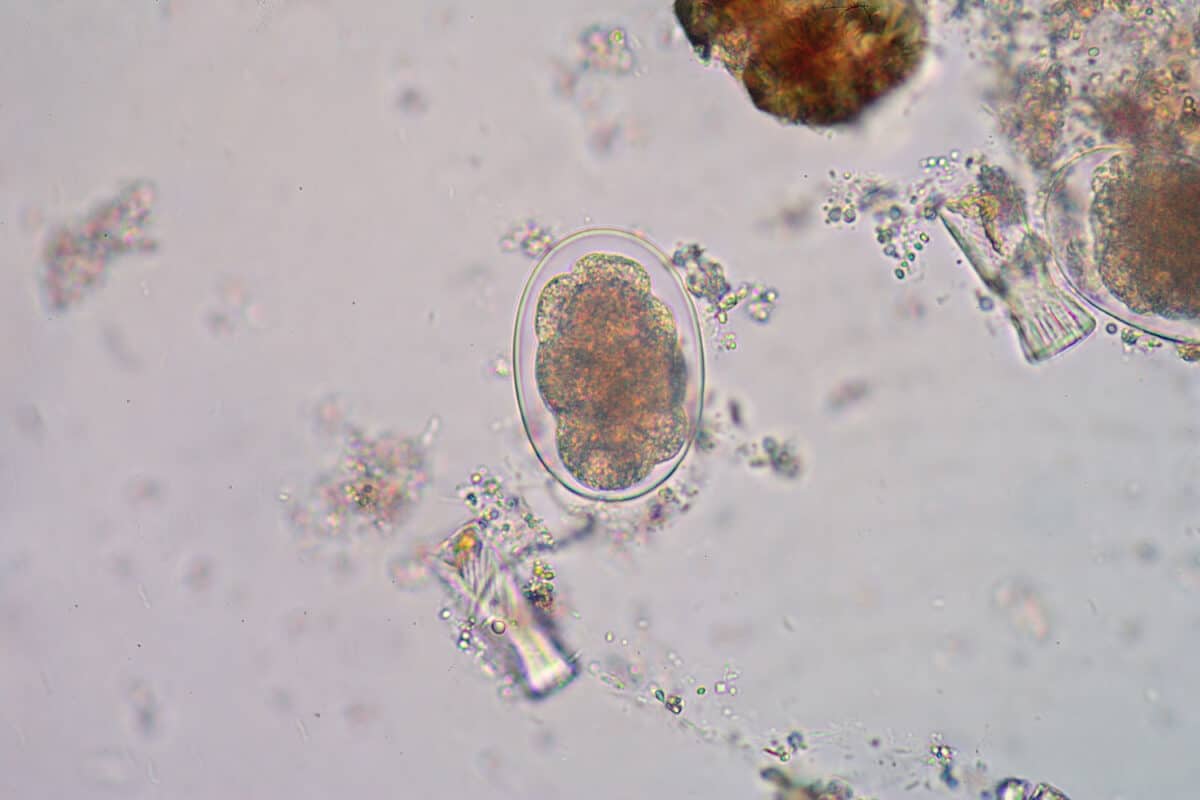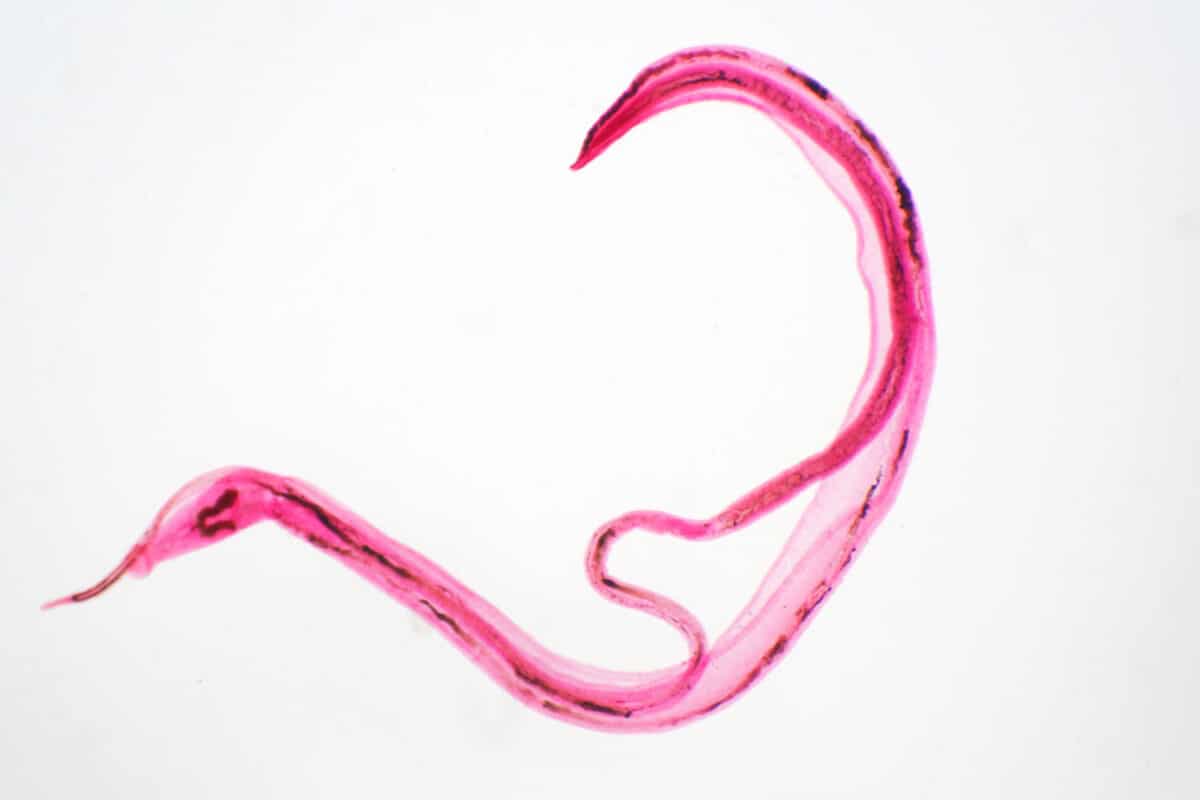Worms? Yikes!
It's an unsettling sight, but unfortunately, a common one. The discovery of worms, be it in the litter box or in your cat's vomit, can make even the most seasoned cat owner's skin crawl.
As much as it makes us squirm, it's important to confront this slimy issue head-on.
As a responsible pet owner, knowing about the various types of worms that can affect your cat's health is essential.
So, brace yourself, because we're about to get into the wriggly world of feline worms, and learn how to keep your cat healthy, happy, and worm-free.
Types Of Worms In Cats
There are four types of worms common to cats: tapeworm, roundworm, whipworm, and hookworm.
1. Tapeworms In Cats
Tapeworms are intestinal parasites that attach themselves to the intestinal wall of cats using their mouths.
They can grow several inches long and, as they grow, pieces may break off, pass through the intestines, and end up in the litter box.

Tapeworms infest cats when they ingest fleas, whether you have seen fleas on your cat or not.
"The cat could have caught a flea from a mouse," says Dr. Cathy Alinovi, who practices in Pine Village, Indiana. "In my practice, I often see barn cats.
Their job, obviously, is to keep mice and vermin out of the barn where we store food for other animals. Tapeworms are a common sight."
If your area has a high flea population, a flea could have entered your house on your clothes or your dog.
Tapeworm eggs typically start in infected bedding or carpets.
Flea larvae consume the eggs and develop into infected fleas, which then move to the cat. The cycle begins anew when the cat licks its fur and swallows the flea.
So how can you tell if your cat has tapeworms? Look for them moving around in the litter box.
While tapeworms may disgust cat owners more than they harm cats, this is the main reason most tapeworm cases end up at the veterinarian's office.
Fortunately, new medications can effectively break the cycle."
2. Roundworms In Cats
Roundworms, as their name suggests, are round. Unlike tapeworms, they don't attach to the intestines; instead, they float freely.
Roundworms pose a greater threat than tapeworms, as they can be life-threatening to kittens and older cats.

If your cat has roundworms, you may notice the following symptoms:
- A pot-bellied appearance
- Stomach discomfort
- Poor appetite
- Vomiting (you may see a roundworm in the vomit, resembling a small strand of spaghetti)
- Diarrhea
- Poor growth in kittens
Roundworms can grow to be three to six inches long. The larvae of these worms reside in a mother cat's mammary glands and pass to kittens through her milk.
Roundworms travel through the cat's body, eventually reaching the intestines and ending up in the litter box.
Dr. Alinovi recommends washing your hands thoroughly after cleaning the litter box or gardening.
Otherwise, if your cat is infected, you might transmit roundworms to yourself by simply eating finger foods or putting your finger in your mouth.
The VCA Hospitals website reports that in one year in the United States, as many as 10,000 cases of roundworm infection in humans have occurred.
The larvae can migrate through various organs, including the eyes. In suitable environments, the eggs can remain infectious to humans and cats for years.
Treatment for roundworms is relatively inexpensive and simple. Veterinarians routinely administer it to newborn kittens and their mothers.
If your adult cat spends time outside, you may want to consider periodic deworming as a precaution.
SIGN UP FOR THECATSITE'S EMAIL UPDATES >
3. Hookworms In Cats
Hookworms are less common and smaller than roundworms, about ½ inch long or less, and not visible in the litter box.

What you may notice is black tarry stools which indicate blood. Left untreated, this can lead to anemia and, in some cases, death.
It’s not certain how cats get hookworms—it could be from infected rodents or mama’s milk. Hookworms can live as long as the cat.
Hookworms are easily treated and should be prompt, as hookworms can penetrate human skin as well.
4. Whipworms In Cats
You can find whipworm eggs in soil, food, and water, as well as in feces and animals that cats might eat. Whipworms can affect cats of any age.

Whipworms may resemble irritable bowel syndrome or other causes of diarrhea. Your cat may show no symptoms at all, or you might notice dehydration, loss of appetite, or anemia.
A veterinarian can confirm the diagnosis with a flotation test.
While treatments work effectively, a follow-up visit with another flotation test will ensure the complete elimination of worms, larvae, and eggs from your cat's body.
Protect Your Feline Friend From Infestations Of Worms
As a responsible cat owner, your pet's health is in your hands. Learning about the different types of worms that can affect your cat is crucial to ensuring their well-being.
While some worms may not cause serious complications, it's always best to have your kitty tested and treated at the first sign of any symptoms.
Remember, some worms can transfer to humans, and no one wants to deal with these uninvited guests.
So, don't let these parasites make a home out of your furry friend. Be proactive in keeping your cat worm-free and ensure a healthy, happy life for your beloved pet.
SIGN UP FOR THECATSITE'S EMAIL UPDATES >
Comments? Leave them using the form below. Questions? Please use the cat forums for those!
Share this information on your Facebook or, even better, pin the image below to your Pinterest board.

Discover more valuable articles below – don't miss out!
Cat Fleas – The Silent Threat To Your Cat
Feline Herpes And Rhinotracheitis: Expert Advice For Cat Owners
Note: We may get commissions for purchases made through links on this page.



.jpg)
3 comments on “The 4 Most Common Worms That Can Make Your Cat Sick”